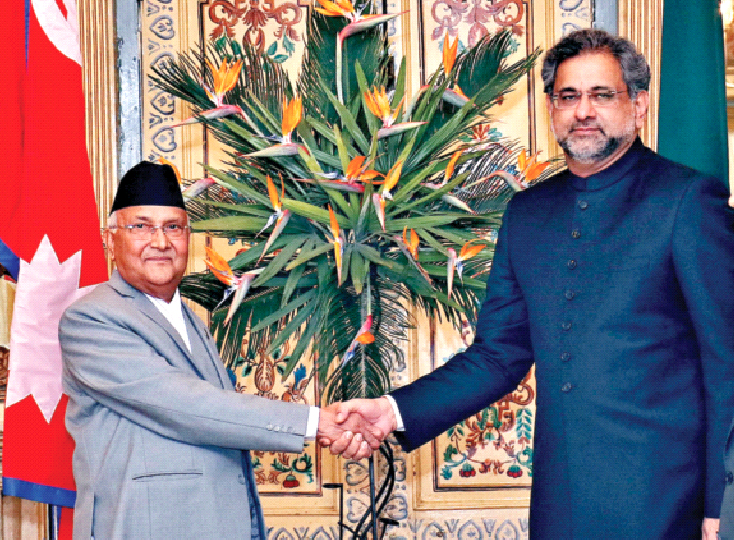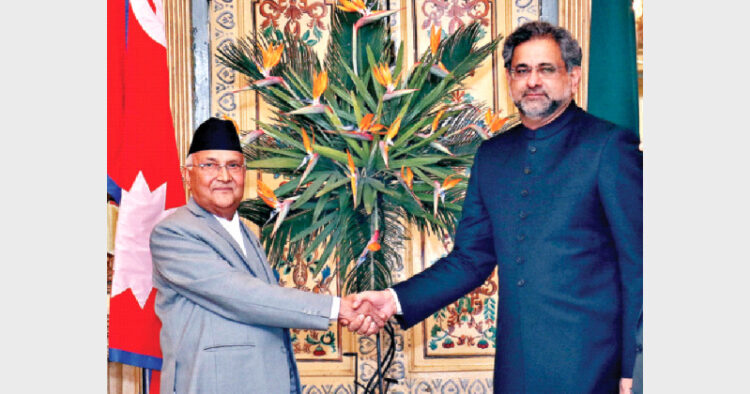 Nepal’s growing proximity with Pak-China is a concern for India. In the strained atmosphere, how the two neighbours address each other’s concerns without worsening the indispensable ties, is a test for both the countries
Nepal’s growing proximity with Pak-China is a concern for India. In the strained atmosphere, how the two neighbours address each other’s concerns without worsening the indispensable ties, is a test for both the countries
Vivek Shukla
The forthcoming visit of Nepal Prime Minister Khadga Prasad Sharma Oli to India would certainly be different. While Oli would be warmly welcomed by the Indian leaders when he would arrive in New Delhi on April 6, but he is likely to be “grilled” too in India for going extra mile to strengthen his country”s ties with China and Pakistan, both India”s baiters and arch rivals even if you do not want to call them “enemies”.
In New Delhi, Oli will be staying at the President house. New Delhi would ensure that Oli feels at home in India though Indian leaders would have some straight talks with him. Basically, India is both wary and concerned after the recent visit of Pakistan’s Prime Minister Shahid Khaqan Abbasi to Nepal. When Pakistan’s Prime Minister Shahid Abbasi was on his two day visit to Nepal recently, India was closely monitoring the visit. Abbasi became the first Prime Minister to visit there since Oli took over as the Prime Minister.
Understandably, India knows pretty well and acknowledges the fact that Nepal is a sovereign nation and it has every right to strengthen ties with any other country whatsoever. Yet, India is concerned due to the fact that dreaded and deadly Pakistan”s intelligence agency ISI may use Nepal to create terror in India. It has done in the past. After all, Indian Air Lines plane was high jacked from Kathmandu. In the run up to the hijacking of the Indian Airlines Flight 814 by Pakistan-based terrorist outfits, the ISI had made Nepal a hub of anti-India terror activities from where it pushed huge quantities of RDX into India. The ISI created various terrorist fronts to carry out terrorist activities in India, including the bomb blasts in New Delhi and several cities across the country.
One of such organisations created by ISI in Pakistan was Jammu and Kashmir Islamic Front (JKIF), with its main base in Kathmandu.
To dispatch men and material and to execute explosions in India, Kathmandu was invariably made the nodal point and JKIF exploited the vulnerable Kathmandu-based Kashmiri businessmen for such activities since they had a readymade and clean past. JKIF used to be controlled from Pakistan by ISI and Tiger Memon, the prime accused in 1993 Mumbai blast case. Their contact in Pakistan-occupied Kashmir was Bilal Beg, who was running an indoctrination camp near Muzaffarabad, funded extensively by the ISI to carry out terrorist acts in India.
Mature Move of India
Like a mature nation, the South Block mandarins did not react after Pak PM completed his Kathmandu visit. That does not mean that India was not keeping an eye on Abbasi-Oli meetings. After the end of Pakistan’s Prime Minister’s visit to Nepal, their foreign office statement described Nepal as an “important, regional country” and “a close friend”. “Our ties with Nepal are characterised by cordiality, mutual respect and commonality of interests. Our support to each other at bilateral and multilateral fora has remained indispensible for both the sides,” the statement added. One should not give much time and importance to such official statements. Of course, there is nothing wrong in this statement. However, India is aware of the fact that if Nepal-Pakistan friendship blossoms, ISI would come into the picture. After all, its main job is to create problems for India.
Proliferation of Madrasas
India is almost certain to raise with Oli the issue of proliferation of madrasas on their side of the India-Nepal border and seek cooperation in checking anti-India activities by such religious schools that are being funded and supported by ISI. India is very much concerned over the activities of the madrasas that have mushroomed along the border inside Nepal during the last few years. A number of madrasas are reported to be carrying out anti-India propaganda and providing safe haven to terrorists who try to sneak into India and act as transit points for carriage of fake Indian currency notes and other contraband items. Income generated from smuggling of these items sustains the operation of the madrasas and help them target India. It is said that India has raised the issue even earlier, but Kathmandu failed to address the matter. India will try to convince Oli that Nepal-Pakistan friendship should not jeopardise India’s security environment as India has suffered in the past. India is equally concerned that since both countries have porous borders, ISI can send terrorists in India.
Wary of Dragon
Meanwhile, India is no less concerned as Oli is considered as pro-China leader. As that was not enough, there is the danger of Nepal joining the Pakistan-China effort against India. Additionally, Nepal has already signed up for China’s Belt and Road Initiative. And there are increasing talks of China constructing railway lines all the way to the Nepal border. If that happens, it could end landlocked Nepal’s dependence on India for land routes for trade. While Oli is seen as a pro-China leader, yet he has chosen India for his first foreign trip after his current tenure started. In a recent interview to the South China Morning Post, Oli was clear that he would broaden his options by deepening ties with China to get more leverage in his dealings with Delhi. “We have great connectivity with India and an open border. All that’s fine and we’ll increase connectivity even further, but we can’t forget that we have two neighbours,” Oli was quoted as saying in the interview. “We don’t want to depend on one country or have one option,” he said. India is equally concerned as there are increasing talks of China constructing railway lines all the way to the Nepal border which could end landlocked Nepal’s dependence on India for land routes for trade.
Ever since Oli became Prime Minister, there has been a speculation whether he will visit Delhi, Beijing or other countries first. He, however, settled for India. It seems that Oli wants close ties with both India and China as Nepal needs both the giant nations. Oli cannot ignore India as both countries share very strong cultural, economic, religious, political and military bonds.
This is Oli’s second stint as the Prime Minister of Nepal. As Prime Minister between 2015 and 2016, he crossed swords with India over the provisions of Nepal’s new constitution. India was of the view that constitution discriminates against the people of the southern plains of Nepal adjoining India who are of Indian ancestry. Due to this very reason, some say that 66 year old Oli nurses some grudges against India. However, India would ensure that both countries bury the acrimonious past and move forward.
(The writer is a senior journalist and former editor of Somaiya Publication)













Comments